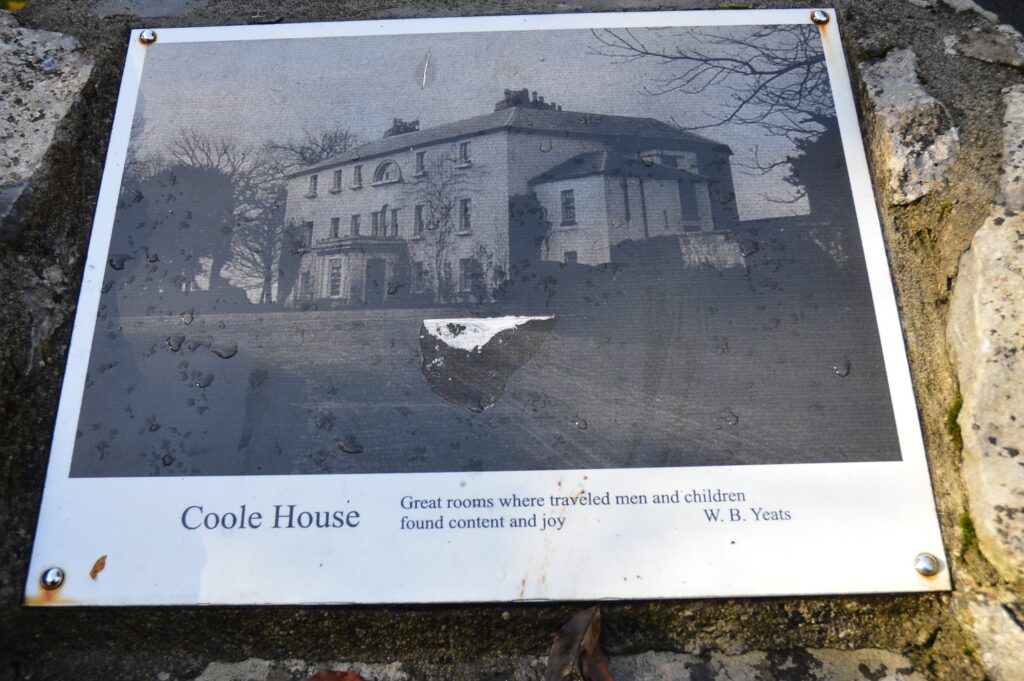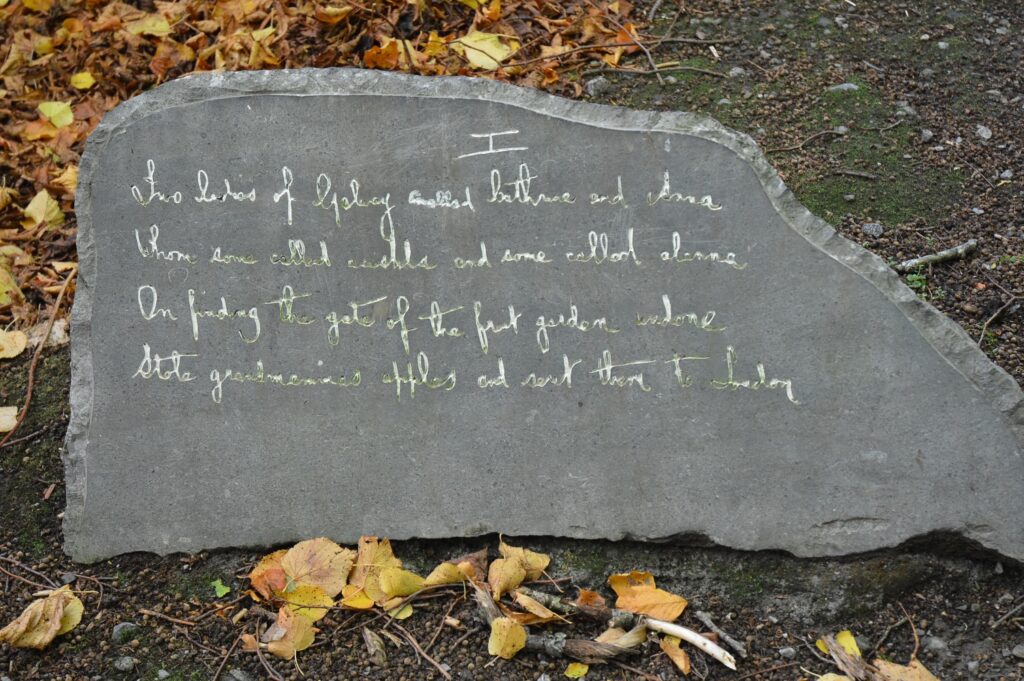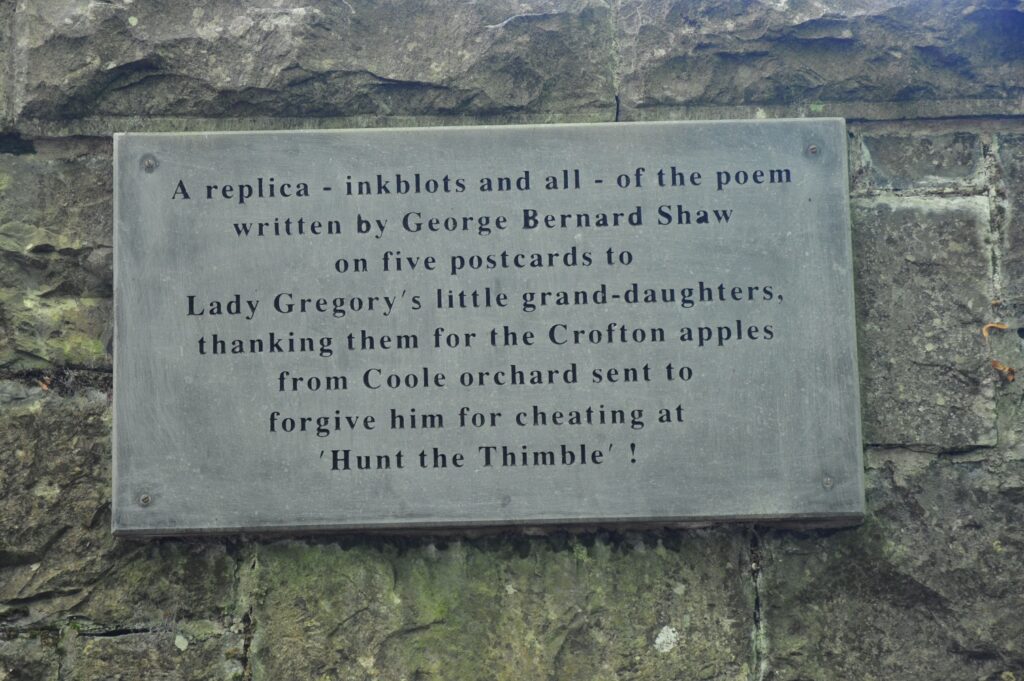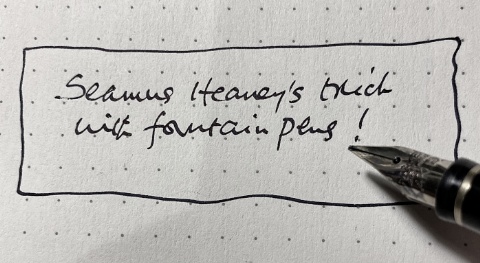In Coole Park
If, as I have done, you ever go in search of Coole House in Co. Galway, on the former estate of Lady Gregory, W.B. Yeats’s friend and patroness, you’re in for disappointment. The house, which was sold to the Irish state by Lady Gregory’s daughter-in-law in 1927, was allowed to fall into ruin, and eventually demolished in 1941 in a remarkable act of official vandalism. So now all the remains is the site where it stood and this faded photograph of the building.
 But the Park surrounding where the house stood is lovely and open to the public. One of the most intriguing things I found there was a sequence of five pieces of slate, each with etched handwritten verses of some doggerel.
But the Park surrounding where the house stood is lovely and open to the public. One of the most intriguing things I found there was a sequence of five pieces of slate, each with etched handwritten verses of some doggerel.
Here’s the first one.
And here’s the explanation!
Quote of the Day
”Here is how platforms die: First, they are good to their users; then they abuse their users to make things better for their business customers; finally, they abuse those business customers to claw back all the value for themselves. Then, they die.”
- Cory Doctorow, writing in Wired.
Musical alternative to the morning’s radio news
Josef Haydn | String Quartet No. 62, Op. 76 No. 3 “Emperor” | Second Movement | Veridis Quartet
Long Read of the Day
“Just Go Back to the Work.”
Film-maker Lizzie Gottlieb has made a documentary film, Turn Every Page, about the remarkable partnership between Robert Caro, the biographer of LBJ, and her father, Robert Gottlieb, his Editor.
Literary Hub has published the transcript of a nice interview that Lisa Liebman did with the film-maker. Here’s how she sets up the conversation…
When director Lizzie Gottlieb set out to explore the remarkable partnership between her father, celebrated book editor Robert Gottlieb, and the preeminent political biographer Robert Caro for her new documentary Turn Every Page, she knew being impartial was not only impossible, it was beside the point. “I thought, I have to bring people in through my eyes,” she says of the high-stakes story she sees as two literary titans “in a race against time to try to finish their life’s work.”
The filmmaker had met many of her now 91-year-old dad’s impressive roster of writers—who included Toni Morrison, John Le Carré, Doris Lessing, Salman Rushdie, and Joseph Heller—during his years running Simon and Schuster, Knopf, and The New Yorker. But the 50-year-relationship between Gottlieb and the now 87-year-old Pulitzer Prize- and National Book Award-winning author of The Power Broker, and the multi-volume The Years of Lyndon Johnson, remained a mystery. (In the film she notes that she didn’t meet Caro, who’s working on the final Johnson book, until her father’s 80th birthday.)
If you like Caro’s books and/or the process of editing, then this is for you.
Books, etc.
Apropos Seamus Heaney’s habit of using a fountain-pen as a dipper, what should I find in Virginia Woolf’s diary for Sunday 3 September, 1922, but this?
”Perhaps the greatest revolution in my life is the change of nibs — no longer can I write legibly with my old blunt tree-stump — people complained — But then the usual difficulties begin — what is to take its place? At the present moment I’m using Blackie [a fountain pen] against his nature, dipping him, that is to say.”`
My commonplace booklet
From Dave Winer…
”I went to ChatGPT and entered “Simple instructions about how to send email from a Node.js app?” What came back was absolutely perfect, none of the confusing crap and business models you see in online instructions in Google. I see why Google is worried. ;-)”
This Blog is also available as a daily email. If you think that might suit you better, why not subscribe? One email a day, Monday through Friday, delivered to your inbox. It’s free, and you can always unsubscribe if you conclude your inbox is full enough already!



